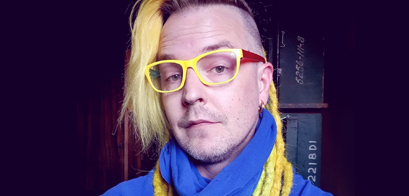 Our podcast, (RE)FRAMED, has been created to center our stories, share our knowledge and contribute to conversations impacting Autistic people, our community and our children. In our own words, we are framing, and re-framing, our stories!
Our podcast, (RE)FRAMED, has been created to center our stories, share our knowledge and contribute to conversations impacting Autistic people, our community and our children. In our own words, we are framing, and re-framing, our stories!
Click here to learn more about (RE)FRAMED and to see all episodes available.
In this rich conversation with Robert Maxwell (they/them), Robert shares their experiences of growing up in Sydney’s Newtown in the 80s-90s, of always feeling like an alien but never an outsider in this diverse and once inclusive part of the world! We talk about the importance of Autistic identity and how that intersects with gender, and joyfully, we chat a bit about 1950’s brutalist architecture, a particular passion for Robert!
Robert is a nonbinary multimedia artist and archaeologist. Having always felt different in terms of their gender and neurology, Rob received an adult diagnosis of Autism in August of 2021. They made history as the first archaeologist to conduct field work in the Chernobyl Exclusion Zone in 2010 and in Fukushima in 2016, which led to them becoming the first Urban Explorer to be admitted as a Fellow International of The Explorers Club since its inception in 1909. Despite being diagnosed with PTSD after a plane accident in 2010, Robert continued to push boundaries in both art and cultural studies, and went on to hold their first solo art exhibition in 2019. Since then, their work has been exhibited in Australia and overseas, across a range of media including painting, installation, sound and photography. In June 2023, Robert will complete their decade-long PhD in contemporary archaeology, which is a global survey of the archaeology of abandonment relating to the 20th and 21st centuries. As D E A T H O F T H E A U T H O R, they released their first EP, ‘Traces’ in 2023.

The Reframing Autism team would like to acknowledge the Traditional Owners of the lands on which we have the privilege to learn, work, and grow. Whilst we gather on many different parts of this Country, the RA team walk on the land of the Awabakal, Birpai, Whadjak, and Wiradjuri peoples.
We are committed to honouring the rich culture of the Aboriginal and Torres Strait Islander peoples of this Country, and the diversity and learning opportunities with which they provide us. We extend our gratitude and respect to all Aboriginal and Torres Strait Islander peoples, and to all Elders past and present, for their wisdom, their resilience, and for helping this Country to heal.